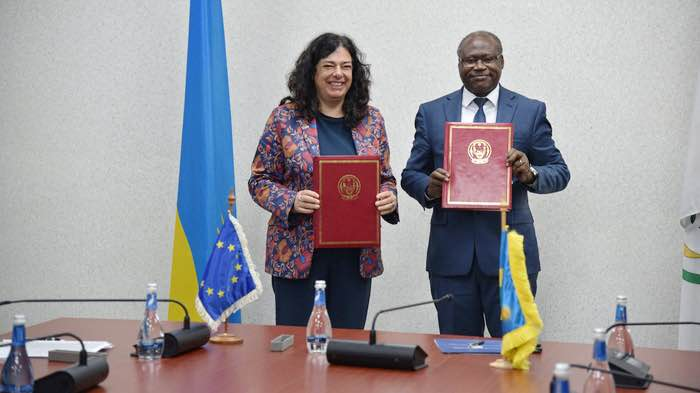
Rwanda’s Minister of Finance Ndagijimana and EU Ambassador Uyarra
Today, Rwanda’s Minister of Finance and Economic Planning Dr Uzziel Ndagijimana and EU Head of Delegation Ambassador Belen Calvo Uyarra signed off on an agreement of €19.5 million in grants to the Government of Rwanda and partner institutions, including civil society, in a bid to strengthen the justice sector and propel reconciliation and human rights efforts in the country.
This funding forms an integral part of the larger €260 million EU support package designated for Rwanda through its 2021-24 Multi-Annual Indicative Programme.
The €19.5 million initiative will play a vital role in realizing the objectives set forth by Rwanda’s Justice, Reconciliation, Law and Order Sector (JRLOS) Strategic Plan 2018-2024, aiming to enhance justice delivery, foster inclusivity, and reinforce human rights.
During the signing event, EU Head of Delegation Ambassador Belén Calvo Uyarra said: “With this comprehensive programme, the EU is pleased to partner the Ministry of Justice, the Judiciary, the National Prosecution Authority, the Rwanda Investigation Bureau (RIB), the Rwanda National Police (RNP), and the National Commission for Human Rights (NCHR), Rwanda Correctional Services and Civil society organisations, in the pursuit of Rwanda’s Vision 2050 for rule of law and justice for all, unity and reconciliation.”
By aligning with Rwanda’s National Strategy for Transformation (NST1) and JRLOS Strategic Plan, this ambitious action further solidifies the EU’s commitment to promoting the rule of law and strengthening human rights in Rwanda.
The program not only bolsters Rwanda’s strides towards achieving Sustainable Development Goal 16 (SDG 16) and Vision 2050 but also empowers civil society and paves the way for a more just and accountable society.
The Minister of Finance and Economic Planning Dr. Uzziel Ndagijimana said: “This Support will contribute to strengthening capacity of the Justice sector by consolidating reconciliation, and a just and equitable society as foundation to economic development for all in Rwanda”.
Under the first component, the action will enhance the professionalism and skills of key justice sector actors, including the Ministry of Justice, the Judiciary, the National Prosecution Authority, the Rwanda Investigation Bureau (RIB), the Rwanda National Police (RNP), and the National Commission for Human Rights (NCHR). By streamlining legal aid support, the initiative will work toward universal and affordable justice for all, with a strong focus on inclusivity for vulnerable groups as well as respect for human rights.
The second component will concentrate on Reconciliation, Rehabilitation, and Unity, offering support to the Rwanda Correctional Service (RCS) and civil society.
Technical, vocational, education, and training (TVET) programs will empower prisoners and former genocide perpetrators with essential skills, reducing recidivism upon their reintegration into society.
Concurrently, the EU will support civil society organisations (CSOs) to carry out socio-psychological healing and reconciliation processes at the community level to enhance resilience and unity across the country.
The third component will focus on amplifying the voice and accountability of civil society. By empowering CSOs to work closely with citizens, the programme aims to tackle issues of accountability effectively.
The initiative is set to build upon the accomplishments of previous programmes carried out by the EU as well as the Embassy of the Netherlands in Rwanda’s justice sector over the past two decades.
In doing so, it will fulfil political, economic, and social rights, and promote gender equality, aligning with Rwanda’s international human rights commitments. (End)
